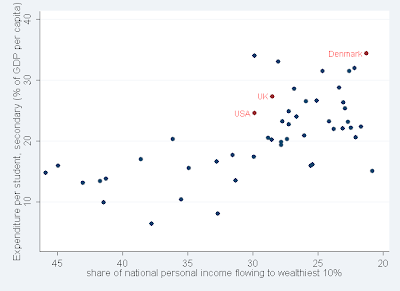 |
| source: World Bank, IMF, open-thinking.com |
The 50 countries above have annual income per capita of USD 5000 or greater. Correlation does not equal causation. But there’s sure some intuitive sense here. On balance, why would the rich pay for the education of other people’s children? Sure, plenty of enlightened ones would know this is sensible. But enlightenment is exceptional. It seems plausible that the higher the income skew, the lower the overall spending on education, because most education is public.
I asked someone from one of the more-egalitarian data points about this. Why does your country provide lots of social services and fund education highly? One hypothesis was size: small countries have no imperial legacy tying them up in expensive strategic commitments or pretensions. Using military spending as a proxy for imperial entanglements generally, the relationship to social spending is roughly as you would expect.
 |
| source: as above |
The fit is not great. But maybe size is important in other ways. Does small size make social consensus easier to achieve? If a small nation comes to a consensus around high taxes and high social spending, then that’s what it will feature. In a larger polity perhaps the dissenting minorities are loud and strong enough to block any such consesnsus, resulting in drift, or ‘path dependence’: you continue doing what you’ve always done. Which, if true, suggests that opportunities to forge a new direction in national priorities might be rare, only appearing in the wake of crisis. For the USA, one such window opened in 2001, and there’s no mistaking the change in priorities. Arguably, another arrived in 2008 with the financial meltdown. It has not been exploited with quite the aplomb of the earlier one. For those in favour of new priorities, the words ‘missed opportunity’ ring loudly.
 |
| source: as above |
The scatterplot above includes countries with annual per capital income equal or greater than USD 13000. The true outliers here are Japan and Germany: both very big countries in the sense we’re discussing (population) and yet very highly ranked in equality (lower Gini numbers are meant to indicate more equal societies). What they have in common is total defeat. Meaning the social order was wiped clean and started over.
Scott, I hope your conclusion is not to “wipe out” the U.S. so that the education system will be better! -Bets